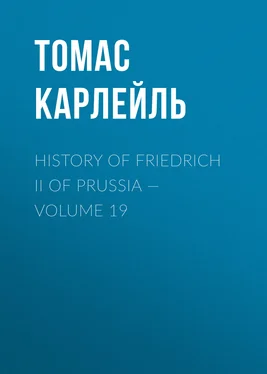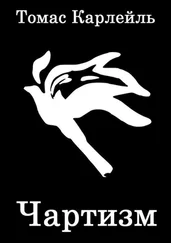Томас Карлейль - History of Friedrich II of Prussia — Volume 19
Здесь есть возможность читать онлайн «Томас Карлейль - History of Friedrich II of Prussia — Volume 19» — ознакомительный отрывок электронной книги совершенно бесплатно, а после прочтения отрывка купить полную версию. В некоторых случаях можно слушать аудио, скачать через торрент в формате fb2 и присутствует краткое содержание. Жанр: foreign_prose, История, literature_19, foreign_edu, foreign_antique, на английском языке. Описание произведения, (предисловие) а так же отзывы посетителей доступны на портале библиотеки ЛибКат.
- Название:History of Friedrich II of Prussia — Volume 19
- Автор:
- Жанр:
- Год:неизвестен
- ISBN:нет данных
- Рейтинг книги:4 / 5. Голосов: 1
-
Избранное:Добавить в избранное
- Отзывы:
-
Ваша оценка:
- 80
- 1
- 2
- 3
- 4
- 5
History of Friedrich II of Prussia — Volume 19: краткое содержание, описание и аннотация
Предлагаем к чтению аннотацию, описание, краткое содержание или предисловие (зависит от того, что написал сам автор книги «History of Friedrich II of Prussia — Volume 19»). Если вы не нашли необходимую информацию о книге — напишите в комментариях, мы постараемся отыскать её.
History of Friedrich II of Prussia — Volume 19 — читать онлайн ознакомительный отрывок
Ниже представлен текст книги, разбитый по страницам. Система сохранения места последней прочитанной страницы, позволяет с удобством читать онлайн бесплатно книгу «History of Friedrich II of Prussia — Volume 19», без необходимости каждый раз заново искать на чём Вы остановились. Поставьте закладку, и сможете в любой момент перейти на страницу, на которой закончили чтение.
Интервал:
Закладка:
"SCHEDULE OF AMOUNTS [say for 1761]. To make up the Twenty-five Million thalers, necessary for the Army, there are:—
"From our Prussian Countries, ruined, harried as THALERS they have been,.......... 4 millions only.
From Saxony and the other Wringings, ..... 7 millions.
English Subsidy (4 of good gold; becoppered into double),........... 8 "
From Ephraim and his Farm of the Mint (MUNZ-PATENT), .......... 7 "
In sum Twenty-six Millions; leaving you one Million of margin,—and always a plenty of cash in hand for incidental sundries. [Preuss, ii. 388.]
"Friedrich's own view of these sad matters, as he closes his History of the Seven-Years War [at "Berlin, 17th December, 1763"], is in these words: 'May Heaven grant,—if Heaven deign to look down on the paltry concerns of men,—that the unalterable and flourishing destiny of this Country preserve the Sovereigns who shall govern it from the scourges and calamities which Prussia has suffered in these times of trouble and subversion; that they may never again be forced to recur to the violent and fatal remedies which we (L'ON) have been obliged to employ in maintenance of the State against the ambitious hatred of the Sovereigns of Europe, who wished to annihilate the House of Brandenburg, and exterminate from the world whatever bore the Prussian name!'" [ OEuvres de Frederic, v. 234.]
OF THE SMALL-WAR IN SPRING, 1759. THERE ARE FIVE DISRUPTIONS OF THAT GRAND CORDON (February-April); AND FERDINAND OF BRUNSWICK FIGHTS HIS BATTLE OF BERGEN (April 13th)
Friedrich, being denied an aggressive course this Year, by no means sits idly expectant and defensive in the interim; but, all the more vigorously, as is observable, from February onwards, strikes out from him on every side: endeavoring to spoil the Enemy's Magazines, and cripple his operations in that way. So that there was, all winter through, a good deal of Small-War (some of it not Small), of more importance than usual,—chiefly of Friedrich's originating, with the above view, or of Ferdinand his Ally's, on a still more pressing score. And, on the whole, that immense Austrian-French Cordon, which goes from the Carpathians to the Ocean, had by no means a quiet time; but was broken into, and violently hurled back, in different parts: some four, or even five, attacks upon it in all; three of them by Prince Henri,—in two of which Duke Ferdinand's people co-operated; the business being for mutual behoof. These latter Three were famous in the world, that Winter; and indeed are still recognizable as brilliant procedures of their kind; though, except dates and results, we can afford almost nothing of them here. These Three, intended chiefly against Reichs people and their Posts and Magazines, fell out on the western and middle part of the Cordon. Another attack was in the extreme eastward, and was for Friedrich's own behoof; under Fouquet's management;—intended against the Austrian-Moravian Magazines and Preparations, but had little success. Still another assault, or invasive outroad, northward against the Russian Magazines, there also was; of which by and by. Besides all which, and more memorable than all, Duke Ferdinand, for vital reasons of his own, fought a Battle this Spring, considerable Battle, and did NOT gain it; which made great noise in the world.
It is not necessary the reader should load his memory with details of all these preliminary things; on the contrary, it is necessary that he keep his memory clear for the far more important things that lie ahead of these, and entertain these in a summary way, as a kind of foreground to what is coming. Perhaps the following Fractions of Note, which put matters in something of Chronological or Synoptical form, will suffice him, or more than suffice. He is to understand that the grand tug of War, this Year, gradually turns out not to be hereabouts, nor with Daun and his adjacencies at all, but with the Russians, who arrive from the opposite Northern quarter; and that all else will prove to be merely prefatory and nugatory in comparison.
JANUARY 2d, 1759: FRANKFURT-ON-MAYN, THOUGH IT IS A REICHSTADT, FINDS ITSELF SUDDENLY BECOME FRENCH. "Prince de Soubise lies between Mayn and Lahn, with his 25,000; beautifully safe and convenient,—though ill off for a place-of-arms in those parts. Opulent Frankfurt, on his right; how handy would that be, were not Reichs Law so express! Marburg, Giessen are outposts of his; on which side one of Ferdinand's people, Prince von Ysenburg, watches him with an 8 or 10,000, capable of mischief in that quarter.
"On the Eve of New-year's day, or on the auspicious Day itself, Soubise requests, of the Frankfurt Authorities, permission for a regiment of his to march through that Imperial City. To which, by law and theory, the Imperial City can say Yes or No; but practically cannot, without grave inconvenience, say other than Yes, though most Frankfurters wish it could. 'Yes,' answer the Frankfurt Magnates; Yes surely, under the known conditions. Tuesday, January 2d, about 5 in the morning, while all is still dark in Frankfurt, regiment Nassau appears, accordingly, at the Sachsenhausen Gate, Town-guard people all ready to receive it and escort it through; and is admitted as usual. Quite as usual: but instead of being escorted through, it orders, in calm peremptory voice, the Town-guard, To ground arms; with calm rapidity proceeds to admit ten other regiments or battalions, six of them German; seizes the artillery on the Walls, seizes all the other Gates:—and poor Frankfurt finds itself tied hand and foot, almost before it is out of bed! Done with great exactitude, with the minimum of confusion, and without a hurt skin to anybody. The Inhabitants stood silent, gazing; the Town-guard laid down their arms, and went home. Totally against Law; but cleverly done; perhaps Soubise's chief exploit in the world; certainly the one real success the French have yet had.
"Soubise made haste to summon the Magistrates: 'Law of Necessity alone, most honored Sirs! Reichs Law is clear against me. But all the more shall private liberties, religions, properties, in this Imperial Free-Town, be sacred to us. Defence against any aggression: and the strictest discipline observed. Depend on me, I bid you!'—And kept his word to an honorable degree, they say; or in absence, made it be kept, during the Four Years that follow. Most Frankfurters are, at heart, Anti-French: but Soubise's affability was perfect; and he gave evening parties of a sublime character; the Magistrates all appearing there, in their square perukes and long gowns, with a mournful joy." [Tempelhof, iii. 7-8; Stenzel, v. 198-200.]
Soubise soon went home, to assist in important businesses,—Invasion of England, no less; let England look to itself this Summer!—and Broglio succeeded him, as Army-Captain in the Frankfurt parts; with laurels accruing, more or less. Soubise, like Broglio, began with Rossbach; Soubise ends with Frankfurt, for the present; where Broglio also gains his chief laurels, as will shortly be seen. Frankfurt is a great gain to France, though an illicit one. It puts a bar on Duke Ferdinand in that quarter; secures a starting-point for attacks on Hessen, Hanover; for co-operation with Contades and the Lower Rhine. It is the one success France has yet had in this War, or pretty much that it ever had in it. Due to Prince de Soubise, in that illegal fashion.—A highly remarkable little Boy, now in his tenth year, Johann Wolfgang Goethe, has his wondering eyes on these things: and, short while hence, meets daily, on the stairs and lobbies at home, a pleasant French Official Gentlemen who is quartered there; between whom and Papa occur rubs,—as readers may remember, and shall hear in April coming.
GRAND CORDON DISRUPTED: ERFURT COUNTRY, 16th FEBRUARY-2d MARCH. "About six weeks after this Frankfurt achievement, certain Reichsfolk and Austrian Auxiliaries are observed to be cutting down endless timber, '18,800 palisades, 6,000 trees of 60 feet,' and other huge furnishings, from the poor Duke of Gotha's woods; evidently meaning to fortify themselves in Erfurt. Upon which Prince Henri detaches a General Knobloch thitherward, Duke Ferdinand contributing 4,000 to meet him there; which combined expedition, after some sharp knocking and shoving, entirely disrooted the Austrians and Reichsfolk, and sent them packing. Had them quite torn out by the end of the month; and had planned to 'attack them on two sides at once' (March 2d), with a view of swallowing them whole,—when they (these Reichs Volscians, in such a state of flutter) privately hastened off, one and all of them, the day before." [Narrative, in Helden-Geschichte, v. 1022 et seq.]
Читать дальшеИнтервал:
Закладка:
Похожие книги на «History of Friedrich II of Prussia — Volume 19»
Представляем Вашему вниманию похожие книги на «History of Friedrich II of Prussia — Volume 19» списком для выбора. Мы отобрали схожую по названию и смыслу литературу в надежде предоставить читателям больше вариантов отыскать новые, интересные, ещё непрочитанные произведения.
Обсуждение, отзывы о книге «History of Friedrich II of Prussia — Volume 19» и просто собственные мнения читателей. Оставьте ваши комментарии, напишите, что Вы думаете о произведении, его смысле или главных героях. Укажите что конкретно понравилось, а что нет, и почему Вы так считаете.









